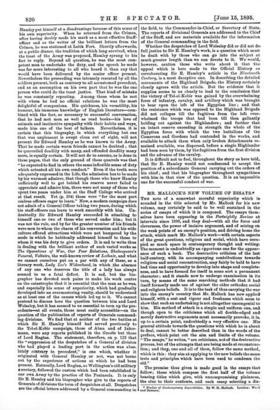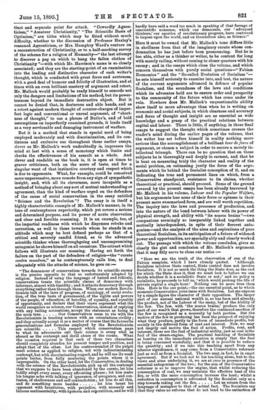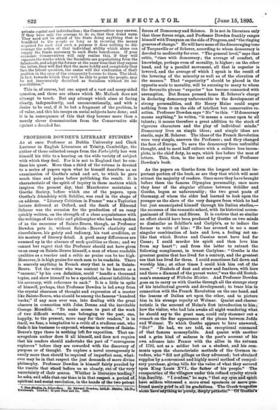MR. MALLOCK'S NEW VOLUME OF ESSAYS.* THB note of a
somewhat scornful superiority which is' sounded in the title selected by Mr. Mallock for his new volume, may certainly be said to be well sustained in the of essays of which it is composed. The essays them- selves have been appearing in the Fortnightly Review at intervals since 1888, and they deal—with all the force and. cleverness, the power of incisive argument, and of seizing on the weak points of an enemy's position, and driving home the- attack, which mark Mr. Mallock's work—with certain aspects of the great questions, religious and social, which have occu- pied so much space in contemporary thought and writing. The moment is undoubtedly an cpportune one for the appear- ance of such a book. The destructive criticism of the last half-century, with its accompanying contributions towards• religious and social reconstruction, may fairly be held to have- had time and opportunity to develop into shape and complete- ness, and to have formed for itself in some sort a permanent character ; and it stands now to undergo examination in its turn, by means of the same searching methods that it had• itself formerly made use of against the older orthodox social. and religions beliefs. It is to the task of thus carrying the war into the enemy's country that Mr. Mallock has now applied' himself, with a zest and vigour and freshness which seem to show that such an undertaking is not altogether uncongenial to him. His method of attack is a simple and uniform one, and though open to the criticisms which all double-edged and merely destructive arguments must necessarily provoke, it is, up to a certain point, undoubtedly a very effective one. His• general attitude towards the questions with which he is about to deal, cannot be better described than in the words of the preface, which point out the aim and limits of the volume. " The essays," he writes, " are criticisms, not of the destructive process, but of the attempts that are being made at reconstruc- tion; and they, one and all of them, follow the same method, which is this : they aim at applying to the new beliefs the same- tests and principles which have been used to condemn the old."
The promise thus given is made good in the essays that follow; those which compose the first half of the volume bearing titles which give, with uncompromising plainness, the clue to their contents, and each essay selecting a dis-
• Studies of Contemporary Superstition. By W. H. Mallook. London: Wad and Downer. tinot and separate point for attack. " Cowardly Agnos- ticism," "Amateur Christianity," "The Scientific Basis of Optimism," are titles which may be fitted without much difficulty, whether to the discussion of Professor Huxley's reasoned Agnosticism, or Mrs. Humphry Ward's venture on a reconstruction of Christianity, or to a half-mocking survey of the scheme for a religion of Humanity—" the last attempt to discover a peg on which to hang the fallen clothes of Christianity "—with which Mr. Harrison's name is so closely associated ; and they are the starting-point of an examination into the leading and distinctive character of each writer's thought, which is conducted with great force and acuteness, with a good deal of humour and felicity of illustration, and at times with an even brilliant mastery of argument and retort. Mr. Mallock would probably be ready himself to concede not only the dangers and limitations of his method, but its power- lessness beyond its immediate destructive object. But it cannot be denied that, in dexterous and able hands, and as a retort against modern thought of counter-charges of imper- fect logic and conventional or unreal argument, of "short- ness of thought," to use a phrase of Butler's, and of bold assumptions on imperfectly examined grounds, it lends itself as a very serviceable and damaging instrument of warfare.
But it is a method that stands in special need of being employed moderately and with discrimination, and its con- tinuous and exclusive use throughout these earlier essays, clever as Mr. Mallock's work undoubtedly is, impresses the mind at last with a sense of monotony which limits and checks the effectiveness of his assault as a whole. And clever and readable as the book is, it is open at times to graver criticisms, both on the score of taste, and for a singular want of that instinctive courtesy and respect which is due to opponents. What, for example, could be conceived more unpersuasive, more remote from any sign of sympathetic insight, and, with all its cleverness, more incapable as a method of bringing about any sort of mutual understanding or agreement, than the kind of warfare urged on the defenders of the cause of social conservatism in the essay entitled " Science and the Revolution "? The essay is in itself a highly characteristic example of Mr. Mallock's manner, in its tone of contemptuous superiority, which yet covers a serious and determined purpose, and its power of acute observation and clear and forcible reasoning. It is an example, too, of the impartial readiness with which he dispenses rebuke and correction, as well to those towards whom he stands in an attitude which may be best defined perhaps as that of a critical and severely candid friend, as to the advanced scientific thinker whose thoroughgoing and uncompromising antagonist he shows himself on all occasions. The extract which follows will illustrate our meaning. Having set forth the failure on the part of the defenders of religion—the "curate contra mundum," as he contemptuously calls him, to deal adequately with the attacks of science, he goes on
:- "The demeanour of conservatism towards its scientific enemy is the precise opposite to that so unfortunately adopted by religion. Instead of using the language of hatred and ridicule, conservatism treats the scientific claims of democracy with deference, almost with timidity ; and it attacks democracy through everything rather than through these. When our modern Revolu- tionists talk of the laws of progress, of sociology, of social evolu- tion, of the true basis of government, of the rights and powers of the people, of education, of heredity, of equality, and equality of opportunity, and declare that their views represent what the world recognises as science, our Conservatives, instead of replying with any railing accusations, accept the statement as being in the main true Our Conservatives seem to vie with the Revolutionists in treating science with an ostentatious civility ; and they actually accept it as a matter of course that the favourite generalisations and formulas employed by the Revolutionists are scientific This respect which conservatism pays to what its adversaries call their science is every whit as absurd as the contempt and shrill abuse of the curate. What the occasion requires is that each of these two characters should completely abandon his present temper and position, and adopt that of the other. Let the controversialist of the pulpit meet science as applied to religion, not with indiscriminating contempt, but with discriminating respect, and he will see its weak points better, from fully mastering the points where it is impregnable. On the other hand, let the Conservative, in dealing with the science of the Revolutionists, pick up all the contempt that we suppose to have been abandoned by the curate, let him boldly adopt every sneer, every affronting phrase ; let him make his tongue ache with talking of ignorance, of arrogance, and con- fusion, of shallowness and self-contradiction ; let him do all this,
and do something more besides let him taunt his opponent with fanaticism, with prejudice, with unmanly and fatuous sentimentality, with hysteria and superstition, and he will hardly have said a word too much in speaking of that farrago of unscientific nonsense, which our democrats, our advanced thinkers,' our apostles of revolutionary progress, have contrived. to impose upon the world, and on themselves also, as Science."
Here it must be owned that Mr. Mallock's tone differs little in shrillness from that of the imaginary curate whose con- demnation he has just before been pronouncing. But he is too able, either as a thinker or writer, to be content for long with merely railing, without coming to closer quarters with his enemy ; and in the essays which close the volume, and which, concern themselves with purely social questions—" Fabian.
Economics " and the " So-called Evolution of Socialism"— he sets himself seriously to examine into, and test, the nature of the current arguments advanced in defence of popular Socialism, and the soundness of the laws and conditions which its advocates hold are to ensure order and prosperity to the community of the future which has come under its. role. Nowhere does Mr. Mallock's unquestionable ability show itself to more advantage than when he is writing on. economic and social subjects, in which clearness and accuracy and force of thought and insight are as essential as wide knowledge and a grasp of the practical relations between capital and labour. There is little, if anything, in these final essays to suggest the thought which sometimes crosses the reader's mind during the earlier pages of the volume, that the writer has set before himself in reality nothing more serious than the accomplishment of a brilliant tour de force of argument, or chosen a subject in order to secure a merely in- tellectual triumph. There can be no question that on these subjects he is thoroughly and deeply in earnest, and that he is bent on measuring truly the character and reality of the social problem, on estimating justly the force of the argu- ments which lie behind the Socialist conception of it, and on. indicating the true and permanent lines on which, from a. Conservative standpoint, resistance to its claims, whether theoretical or practical, should proceed. Some of the ground covered by the present essays has been already traversed by Mr. Mallock in his volume, Labour and the Popular Welfare, but his arguments lose none of their force or aptness in their present more summarised form, and are well worth repetition. The inquiry into the laws and processes of production, and. into the nature of the bond between labour with its power of physical strength, and ability with "its scarce brains "—two companions seemingly so inseparably linked together and mutually interdependent, in spite of their fiercest anta- gonism—and the analysis of the aims and aspirations of pure theoretical Socialism, in its anticipation of a future of widened power and opportunities, are specially ably and clearly worked out. The passage with which the volume concludes, gives so clearly the gist and conclusion of Mr. Mallock's argument that it may fitly serve to close our notice :—
" Here we see the truth of the observation of one of the Fabian essayists, which I have already quoted. Although Socialism involves State control, State control does not involve Socialism, It is not so much the thing the State does, as the end for which the State does it, that we must look to before we can decide whether it is a socialistic State or not ;' and no policy is socialistic, he proceeds to tell us, which would prolong the life of private capital a single hour.' Nothing can be more true than this. Here is the one point,—the one essential point, as to which economic Conservatism joins issue with Socialism. Let me express by a simple figure the character of their opposition. The larger part of our annual national wealth is, as has been said already,. the product, not of the Labour of the many, but of the Ability of the few. The few, with 'the scarce brains,' produce the only part of our wealth that grows, therefore the continued exertion of the few is recognised as a necessity by both parties. But the motive of the few in producing has been the prospect of enjoying what they produce, partly in the form of immediate profits, but mainly in the deferred form of rent and interest. Now, we may not inaptly call motive the fuel of action. Profits, rent, and interest, these are the fuel of industrial ability, just as coal is the fuel of the steam-engine. The practical teaching of Socialists as bearing on the immediate situation is simply that the fuel. is being consumed wastefully, and that it is possible to reduce the quantity ; and if we take this teaching apart from any ulterior significance, it may come from a Conservative reformer just as well as from a Socialist. The two may, in fact, be in exact agreement. But if we look not to his teaching alone, but to the views and aims underlying it, we are at once in presence of the essential antagonism of the two; for the aim of the Conservative reformer is so to improve the engine, that whilst reducing the consumption of coal, we may maintain the effective heat of the fire, or with the same consumption increase the heat ; whilst a reduction in consumption is advocated by the Socialist only as a
step towards raking out the fire Let us return from the language of metaphor to that of actual fact. The Socialists say that they value no reforms that do not tend to the extinction of private capital and individualism ; the Conservatives may answer, if they have only the courage to do so, that they dread none. They need not be afraid of the State doing anything that is beneficial to the people so long as in securing the money required for such and such a purpose it does nothing to dis- courage the action of that individual ability which alone can supply the funds necessary to such State beneficence. If your economic Conservatives will only realise this, if they will separate the truths which the Socialists are popularising from the falsehoods, and adopt the former at the same time that they expose the latter, they will find that the more boldly and completely they face the labour question, the easier will the vindication of their position in the eyes of the community become to them. The ideal, in fact, towards which they will be able to point the people, may be not inaccurately described as Socialism without its im- possibilities."
This is, of course, but one aspect of a vast and many-sided question, and there are others which Mr. Mallock does not attempt to touch. But any attempt which aims at facing clearly, independently, and unconventionally, and with a desire to be real, if it be but a fragment of the problem, is of value, and this his essays on social subjects have done; and it is in consequence of this that they become more than a merely clever demonstration from the Conservative side against a dreaded foe.




































 Previous page
Previous page